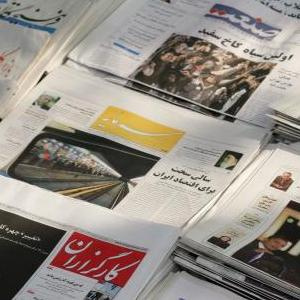Tehran’s Daily Newspaper Review

Jomhouri-ye Eslami reported of the “Zionist Regime’s plot to construct settlements in Iraq”, as part of Israel’s plan to control parts of Iraq. Mubarak’s trial, Ayatollah Makarem’s criticism of Khatoon and the Judiciary Speaker’s remarks also appeared on Jomhouri-ye Eslami’s front page. The newspaper reported of the Libyan revolutionaries’ flag waved near Tripoli and call by the Leadership’s office for aids for the Somalis. In its editorial, the newspaper criticized Saudi Arabia for its double standards, that is, sending troops to suppress the Bahrainis’ uprising while expressing frustration over the death of protestors in Syria.
Kayhan’s top headline spoke of “Iraq’s bloody Monday” which left 66 Iraqis dead and 238 wounded. Kayhan also quoted Judiciary Speaker Gholam-Hossein Mohseni Eje’i who had supported police collecting illegal satellite dishes (which consist nearly the entire set of dishes) across Tehran. Kayhan’s editorial started with a celebration of the fifth anniversary of Hezbollah’s victory over Israel in the 33-day war, then moved on to mock the fragile British government’s handling of the recent protests and concluded with calling for unity –among domestic political factions and among regional states- to seize the opportunity and retrieve their lost power as US’ clout is on the decline.
With large fonts, Resalat quoted the British PM David Cameron on the “moral collapse” of the British society. In a piece titled “Facebook rendezvous, the enemy’s new plan”, Resalat reported of a recent Facebook-organized campaign in Tehran run by the youngsters “in guise of a legal charitable act.” The newspaper reported that many families are still unaware of the complexity of the enemy’s new scenario. “God in politics and the society”, Resalat’s editorial written by its political editor Amir Mohebbian, criticized the domination of positivistic views on post-Revolution policies and called for reconsidering the role of God, based on Islamic teachings, in politics.
A potentially controversial interview between the Fars news agency and Ali Motahhari, the exceptionally honest, outspoken conservative MP deserved the front page top headline for Shargh, titled “Ali Motahhari decoding the 2009 [presidential] election”. In his interview, Motahhari openly talked about the Reformists, the 2009 presidential election and its aftermath, Mir-Hossein Mousavi and Mahmoud Ahmadinejad. Shargh also covered the trip made by Russia's National Security Chairman to Iran to discuss a step-by-step plan to break the nuclear impasse. Shargh’s op-ed was written by Mohammad-Ali Sobhani, Iran's former ambassador to Amman, on why King Abdullah of Jordan will not leave power despite the protests in his country.
Tehran-e Emrooz reported that Malekzadeh, Mashaei’s close aid whose appointment to a senior position in the foreign ministry brought Ali-Akbar Salehi the risk of impeachment, and the “sorcerers”, are still in detention. The newspaper also quoted Ayatollah Mahdavi Kani, busy with gathering the Principlists under one flag for the upcoming parliamentary election, that “Anyone who has endorsed the principles of Islam and the Revolution is a Principlist.”
* Note: Vatan-e Emrooz does not publish on Thursdays.
Trouble with understanding some terms? Check our Glossary of Iranian Political Terms.
Briefing
Hamshahri (Citizen) is the official daily newspaper of Tehran's Municipality. Its general directions in politics, culture and economy are determined by the mayor of Tehran, currently Mohammad Baqer Qalibaf.
Iran is the official organ of the administration.
Jomhouri-ye Eslami (The Islamic Republic) was known as the official organ of the Party of the Islamic Republic, founded in 1979 and disbanded in 1987. Currently, it is an open critique of Mahmoud Ahmadinejad's policies and is known to be a mouthpiece of Akbar Hashemi Rafsanjani.
Kayhan (Universe) is a hard-line conservative newspaper. Its editor-in-chief –currently Hossein Shari’atmadari- is appointed by Iran's Supreme Leader. Shari’atmadari’s editorials often spark off controversy and debate inside Iranian political circles.
Resalat (Mission) belongs to the moderate wing of the principlist camp. Resalat’s best known analyst is Amir Mohebbian, its political editor.
Shargh (East) is a moderate reformist newspaper. It was the most popular and influential reformist newspaper in its first period of publication which lasted from August 2003 until September 2006.
Tehran-e Emrooz (Tehran Today) is a ‘principlist reformist’ newspaper, connected to Mohammad Baqer Qalibaf.
Vatan-e Emrooz (Motherland Today) -which started its publication in November 2008-, belongs to Mehrdad Bazrpash, the thirty-old pro-Ahmadinejad politician who is also head of Iran's second largest auto manufacturer company, Saipa. Vatan-e Emrooz is a supporter of the president’s policies.

